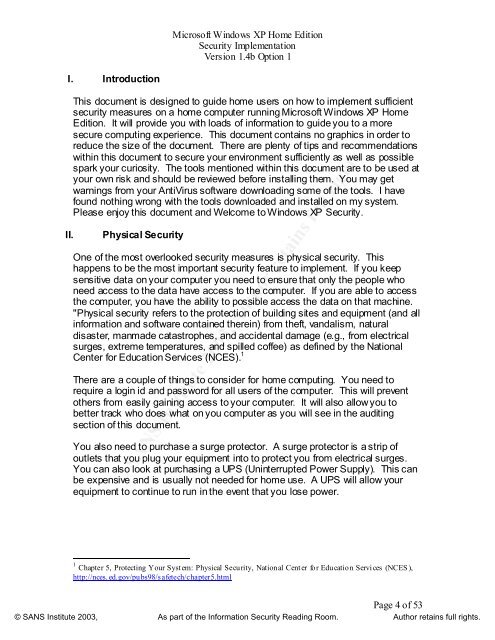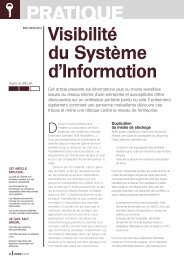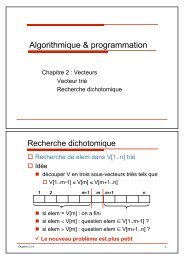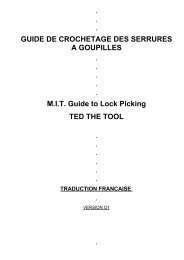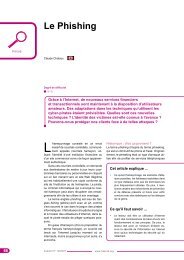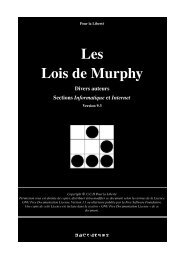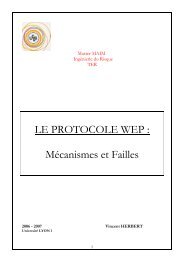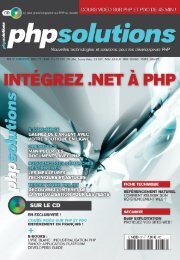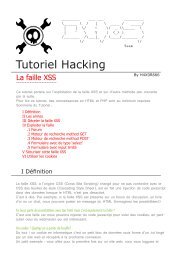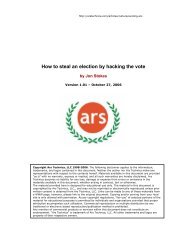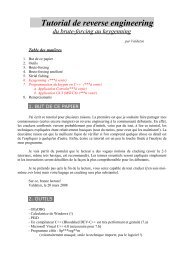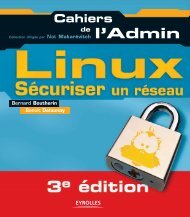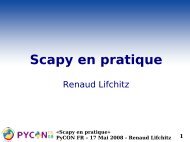Microsoft Windows XP Home Edition - Zenk - Security - Repository
Microsoft Windows XP Home Edition - Zenk - Security - Repository
Microsoft Windows XP Home Edition - Zenk - Security - Repository
Create successful ePaper yourself
Turn your PDF publications into a flip-book with our unique Google optimized e-Paper software.
I. Introduction<br />
<strong>Microsoft</strong> <strong>Windows</strong> <strong>XP</strong> <strong>Home</strong> <strong>Edition</strong><br />
<strong>Security</strong> Implementation<br />
Version 1.4b Option 1<br />
This document is designed to guide home users on how to implement sufficient<br />
security measures on a home computer running <strong>Microsoft</strong> <strong>Windows</strong> <strong>XP</strong> <strong>Home</strong><br />
<strong>Edition</strong>. It will provide you with loads of information to guide you to a more<br />
secure computing experience. This document contains no graphics in order to<br />
reduce the size of the document. There are plenty of tips and recommendations<br />
within this document to secure your environment sufficiently as well as possible<br />
spark your curiosity. The tools mentioned within this document are to be used at<br />
your own risk and should be reviewed before installing them. You may get<br />
warnings from your AntiVirus software downloading some of the tools. I have<br />
Key<br />
found<br />
fingerprint<br />
nothing<br />
=<br />
wrong<br />
AF19<br />
with<br />
FA27<br />
the<br />
2F94<br />
tools<br />
998D<br />
downloaded<br />
FDB5 DE3D<br />
and<br />
F8B5<br />
installed<br />
06E4<br />
on<br />
A169<br />
my<br />
4E46<br />
system.<br />
Please enjoy this document and Welcome to <strong>Windows</strong> <strong>XP</strong> <strong>Security</strong>.<br />
II. Physical <strong>Security</strong><br />
One of the most overlooked security measures is physical security. This<br />
happens to be the most important security feature to implement. If you keep<br />
sensitive data on your computer you need to ensure that only the people who<br />
need access to the data have access to the computer. If you are able to access<br />
the computer, you have the ability to possible access the data on that machine.<br />
"Physical security refers to the protection of building sites and equipment (and all<br />
information and software contained therein) from theft, vandalism, natural<br />
disaster, manmade catastrophes, and accidental damage (e.g., from electrical<br />
surges, extreme temperatures, and spilled coffee) as defined by the National<br />
Center for Education Services (NCES). 1<br />
There are a couple of things to consider for home computing. You need to<br />
require a login id and password for all users of the computer. This will prevent<br />
others from easily gaining access to your computer. It will also allow you to<br />
better track who does what on you computer as you will see in the auditing<br />
section of this document.<br />
You also need to purchase a surge protector. A surge protector is a strip of<br />
outlets that you plug your equipment into to protect you from electrical surges.<br />
You can also look at purchasing a UPS (Uninterrupted Power Supply). This can<br />
be expensive and is usually not needed for home use. A UPS will allow your<br />
equipment to continue to run in the event that you lose power.<br />
© SANS Institute 2003, Author retains full rights<br />
Key fingerprint = AF19 FA27 2F94 998D FDB5 DE3D F8B5 06E4 A169 4E46<br />
1 Chapter 5, Protecting Your System: Physical <strong>Security</strong>, National Center for Education Services (NCES ),<br />
http://nces. ed.gov/pubs98/safetech/chapter5.html<br />
Page 4 of 53<br />
© SANS Institute 2003, As part of the Information <strong>Security</strong> Reading Room. Author retains full rights.


